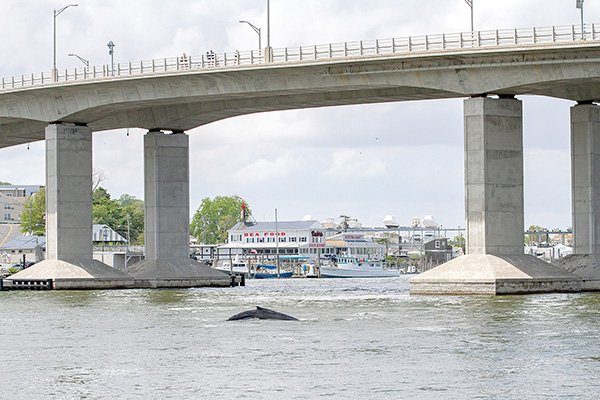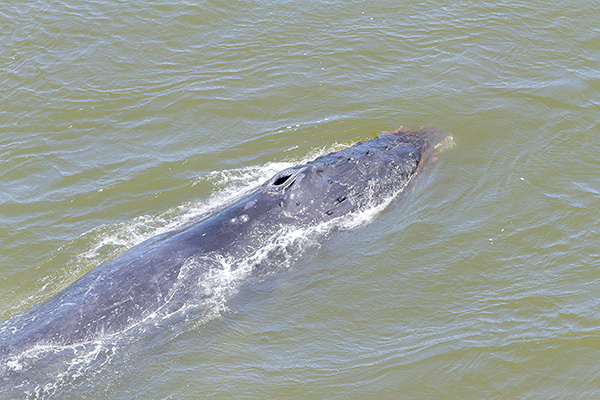
By Elizabeth Wulfhorst
The Atlantic Ocean is a natural habitat for the humpback whale. The Shrewsbury River is not.
“This is the first time in 45 years that we’ve been recording it that we had a humpback reported in the river,” said Robert Schoelkopf, founding director of the Marine Mammal Stranding Center (MMSC) in Brigantine.
On a bright, clear Friday, May 29, a crew from the MMSC followed a juvenile humpback around for about five hours before it swam back out into Sandy Hook Bay, Schoelkopf said.
“We were following it because it doesn’t belong in the river,” he said. “It doesn’t belong in that habitat.”
But what the MMSC crew and the crew on a state police boat also following the whale couldn’t see from their vantage point was something potentially much more problematic than the whale’s location.
At around 1:30 p.m., local photographer Michael McKenna said he stopped at 2nd Jetty Seafood in Sea Bright to place a dinner order and noticed people on the bridge pointing at the water. He grabbed his camera and headed to the riverbank where he witnessed the whale get hit by a boat. “I could hear the people across the river yelling and screaming when it happened,” he said.
While the animal seemed unfazed by the encounter, McKenna said, it continued to swim around under the bridge.
“I decided to walk up onto the bridge for a different perspective,” he said, which is how he captured a disturbing image: a fishing net covered the whale’s face.
McKenna notified MMSC as soon as he realized the whale was tangled in a net, but at that point the animal had already made its way back out of the river, thanks to a low tide and the possible underwater communications from other whales in the bay, according to Schoelkopf. “It could be anywhere by now,” he said.

However, after McKenna’s call Saturday, Schoelkopf said they immediately alerted the Center for Coastal Studies in Provincetown, Massachusetts which has a Marine Mammal Entanglement Response team. The center is one of the only organizations on the East Coast federally authorized to assist whales tangled in nets and fishing lines.
“It is very dangerous” to try to help a whale caught in a net, both for the people helping and the whale, said Schoelkopf. “You can’t guide a 30-foot whale around and ask it to stand still while you cut off the net,” he said.
Schoelkopf said the MMSC also advised the U.S. Coast Guard, the New Jersey State Police Marine Services Bureau, the New Jersey Division of Fish & Wildlife and other organizations to keep an eye out for the whale, but it has not been spotted again.
The MMSC, a nonprofit organization since 1978, rescues and cares for stranded and injured marine mammals and sea turtles in New Jersey and attempts to rehabilitate the animals for release into the wild. It has responded to over 5,100 whale, dolphin, seal and sea turtle strandings since its inception, according to its website. MMSC’s funding comes from donations, grants, memberships and fundraising efforts.
Schoelkopf noted that dolphins often get stranded in the Shrewsbury River because of the natural layout of the Sandy Hook coastline. While in Sandy Hook Bay, if the animals head south following food on the west side of Sandy Hook, they don’t realize they are headed into the river instead on the east side and into the open ocean.
Whales were spotted off the coast of Belmar Tuesday morning, but it is not known if the Shrewsbury River humpback was one of them. The animals
are most likely feeding heavily on the plentiful menhaden, an oily fish that is part of the humpback’s natural diet.
The article originally appeared in the June 4 – 10, 2020 print edition of The Two River Times.














